走出牛津第一册 Unit 6 Part 1
上海牛津英语六年级第一学期6AUnit1教案设计(5课时)

上海牛津英语六年级第一学期6AUnit1教案设计(5课时)Module 1 Family and friendsUnit 1 Family and relatives (Period 1)Tasks in this unitTalking about one’s family and relatives; writing greetings cards; talking about family leisure activities and frequency.Language focus:Using demonstratives to refer to peoplee.g., These are my family and relatives. This is my grandfather.Language skills:Listening Listen for specific informationReading Identify details that support a main ideaWriting Write out a piece of work by presenting writing using appropriate layout and visual support including charts Materials:Student’s Book 6A page 2Workbook 6A pages 1 and 2Pre-task preparationAsk individual students about their family: e.g., How many people are there in your family? Who are they? to elicit: e.g., My mother, my father, my sister, my brother and me. Write the family members on the board to create a typical family tree.While-task procedure1 Give the students time to look at the family tree in Look and learn. Play the cassette. Thestudents listen.2 In pairs, students take turns pointing to the family tree and asking: Who’s that? to elicit: e.g.,That’s Alice’s grandmother.3 Give the students time to look at the pictures in Look and read. Play the cassette. Thestudents repeat.4 Select two students to read the first dialogue. Then ask each of them: Who are you? to elicit:I’m their son/daughter.5 Select three pairs of students to read the second dialogue. Then ask the pairs: Who are you?to elicit: We’re their sons/grandsons/granddaughters.ConsolidationWorkbook 6A pages 1 and 2教后感:开学的第一节课,学生很有热情,但反映出的问题也很多。
牛津6AUnit1知识点整理(通用3篇)
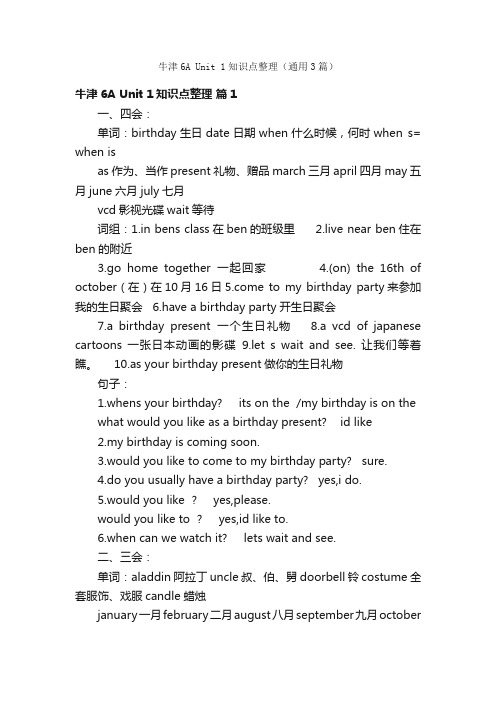
牛津6A Unit 1知识点整理(通用3篇)牛津6A Unit 1知识点整理篇1一、四会:单词:birthday生日date日期when什么时候,何时when s= when isas作为、当作present礼物、赠品march三月april四月may五月june六月july七月vcd影视光碟wait等待词组:1.in bens class在ben的班级里 2.live near ben住在ben的附近3.go home together一起回家4.(on) the 16th of october(在)在10月16日e to my birthday party来参加我的生日聚会6.have a birthday party开生日聚会7.a birthday present一个生日礼物8.a vcd of japanese cartoons 一张日本动画的影碟9.let s wait and see. 让我们等着瞧。
10.as your birthday present做你的生日礼物句子:1.whens your birthday? its on the /my birthday is on thewhat would you like as a birthday present? id like2.my birthday is coming soon.3.would you like to come to my birthday party? sure.4.do you usually have a birthday party? yes,i do.5.would you like ? yes,please.would you like to ? yes,id like to.6.when can we watch it? lets wait and see.二、三会:单词:aladdin阿拉丁uncle叔、伯、舅doorbell铃costume全套服饰、戏服candle蜡烛january一月february二月august八月september九月october十月november十一月december十二月first第一second第二third第三fourth第四fifth第五sixth第六twelfth第十二twentieth第二十twenty-first第二十一词组:1.have a cake with lots of strawberries吃一块草莓蛋糕2.happy birthday to you!祝你生日快乐3.take off脱下take off his costume脱下戏装4.blow out吹灭blow out the candles吹灭蜡烛5.open the door开门句子:1.the doorbell is ringing.2.he is giving ben some cartoons as a birthday present.3.ben is blowing out the candles on the cake.its time for some cake.三、语音:/ / dear hear near year牛津6a unit 2知识点整理来自。
牛津小学英语6A Unit 1 (第一课时)教案
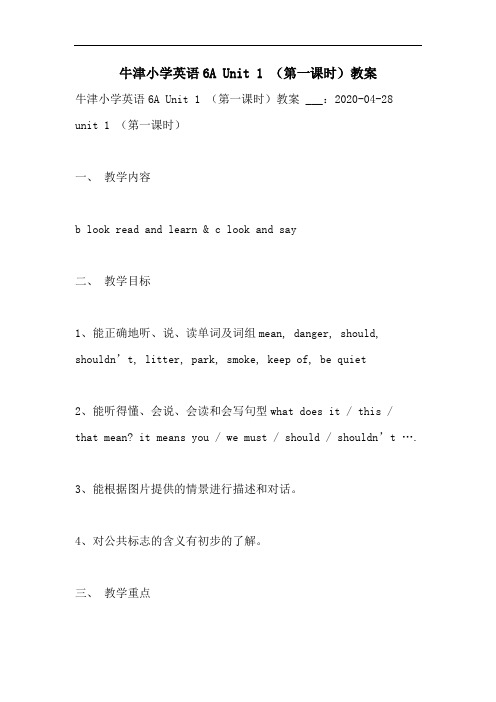
牛津小学英语6A Unit 1 (第一课时)教案牛津小学英语6A Unit 1 (第一课时)教案 ___:2020-04-28unit 1 (第一课时)一、教学内容b look read and learn &c look and say二、教学目标1、能正确地听、说、读单词及词组mean, danger, should, shouldn’t, litter, park, smoke, keep of, be quiet2、能听得懂、会说、会读和会写句型what does it / this /that mean? it means you / we must / should / shouldn’t ….3、能根据图片提供的情景进行描述和对话。
4、对公共标志的含义有初步的了解。
三、教学重点1、能正确地听、说、读单词及词组mean, danger, should, shouldn’t, litter, park, smoke, keep of, be quiet2、能听得懂、会说、会读和会写句型what does it / this /that mean? it means you / we must / should / shouldn’t ….四、教学难点1、能正确地听、说、读、写词组keep of, be quiet2、引导学生正确地理解所给公共标志的含义五、教学准备1、教具准备1)小卡片(公共标志),录音机,磁带2)关于本课时的多媒体课件。
2、板书准备:写好课题和日期。
六、教学过程step 1 free talk/ revision1 good morning,boys and girls.2 let’s sing a song.3 give the students some orders:“stand up.”“clean the desk.”…step 2 presentation and pratice1. show some sign pictures of public signs to teach the title “public signs”.2. aording to the description to teach the public signs.first“keep quiet”, “ do not touch”, “ keep off the grass”, “no eating and drinking”.then“no parking”, “no smoking”, “no littering”, “no cycling”, “danger”.teach the new words: smoke, litter, cycle, danger.3. show the public signs quickly.play the match game: put the right pictures in the right place.step 3 look, read and learn1. read the public signs after the tape recorder one by one.2. read altogether.3. practice in pairs, one points another says. step 4 practice1. show the pictures and ask:what does it mean?right / wrong. it means “…”.teach “it means….”2. what does it mean?yes. it means “…”.it means you should / shouldn’t….teach “should / shouldn’t”.3. pracitc:what does it mean?step 5 consolidationask the students to practice part c.七、作业设计1. copy the phrases in english 3 times, and in chinese for once.2. do the workbooks.3. describe some public signs using the short dialogue.八、板书设计unit 2 public signs date.pictures of part bsome phrases and the small pictures 模板,内容仅供参考。
牛津小学英语 6A Unit 1 详解
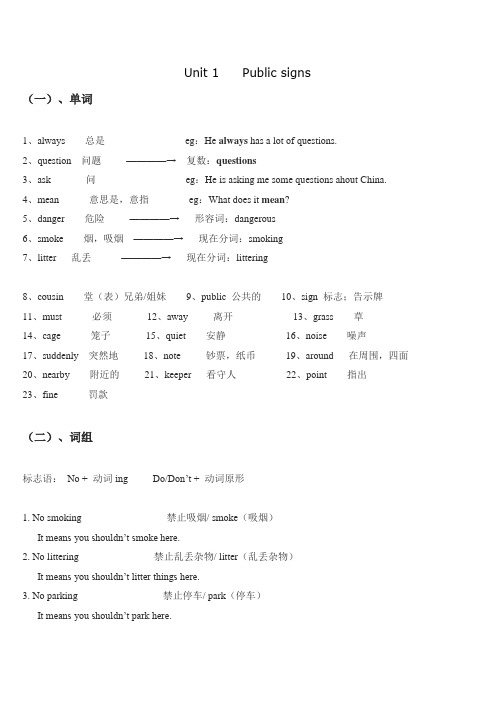
Unit 1 Public signs(一)、单词1、always 总是eg:He always has a lot of questions.2、question 问题————→ 复数:questions3、ask 问eg:He is asking me some questions ahout China.4、mean 意思是,意指eg:What does it mean?5、danger 危险————→ 形容词:dangerous6、smoke 烟,吸烟————→ 现在分词:smoking7、litter 乱丢————→ 现在分词:littering8、cousin 堂(表)兄弟/姐妹9、public 公共的10、sign 标志;告示牌11、must 必须12、away 离开13、grass 草14、cage 笼子15、quiet 安静16、noise 噪声17、suddenly 突然地18、note 钞票,纸币19、around 在周围,四面20、nearby 附近的21、keeper 看守人22、point 指出23、fine 罚款(二)、词组标志语:No + 动词ing Do/Don’t + 动词原形1. No smoking 禁止吸烟/ smoke(吸烟)It means you shouldn’t smoke here.2. No littering 禁止乱丢杂物/ litter(乱丢杂物)It means you shouldn’t litter things here.3. No parking 禁止停车/ park(停车)It means you shouldn’t park here.4. Do not touch 禁止触摸It means you shouldn’t touch it.5. Danger!危险It means you must stay away from here.6. No eating or drinking 禁止吃喝It means you shouldn’t eat or drink here.7. Keep off the grass 不接近草坪/ keep off(不接近)It means you shouldn’t walk on the grass. It means you should keep off the grass.8. Be quiet / keep quiet 保持安静It means you shouldn’t make noise here. It means you should keep quiet here.9. his cousin 他的表弟10. only four years old 仅仅只有四岁11. a lot of questions 许多问题12. some public signs 一些公共标志13. ask some questions 问一些问题14. mean different things 表示不同的意思15. stay away from 远离16. walk on the grass 在草地上行走17. on the bird’s cage 在鸟笼上18. make noise 发出吵闹声/制造噪音19. know a lot about 知道很多关于20. near the bird’s cage 在鸟笼附近21. take a walk 散步=go for a walk 22. see something 看见某物23. a ten-yuan note 一张十元纸币24. look around 环顾四周25. walk to the note 走向那张纸币26. pick up 捡起/ pick it up(捡起它)27. a park keeper 一位公园看守人28. come up to 走到...前面29. point to 指向30. say to 对...说31. Can't you see ? 你没看见吗?32. fine 10 罚款10 元练习1、词性转换(1)smoking的动词原形_______ (2)want的同义词组________ (3)eat的现在分词_________ (5) be quiet的反义词组_________ (4)should的否定式________2、英汉互译(1)公共标志__________ (2)在鸟笼上___________ (3)远离____________(4)禁止践踏草坪___________ (5)知道很多关于___________ (6)进去__________(7)制造噪音___________ (8)问问题____________ (9)散步________________ (10)把它们捡起____________ (11)在网上______________ (12)环顾四周_____________3、用所给单词的适当形式填空(1)The sign______(mean) you ________(should) touch it.(2)The park______(keep) comes_______(down) to him.(3)You must______(do)your homework now.(4)It means‘No________’(swim).You can’t_______(swim) here.(5)Don’t________(make) noise here.(6)My sister____________(show) his stamps to______(I) now.(7)Tom always__________(take) a walk on Sundays.(8)Ben and Lily are in the same______(school),but they’re in different________(class).(三)、重要句型1. ——What does it / this / that mean? 它/这个/那个是什么意思?——It means you/we must /should / shouldn't +动词原形...意思是你们/我们必须/应当/不应该.......2. —— Can I ... ?——①No, you can’t. You should... now.②Yes,you can.(四)、核心语法1、mean 的用法。
牛津少儿英语1A LET's GO unit6上

How’s = How is It’s = It is
How’s the weather today?
It’s sunny. It’s a sunny day.
How’s the weather today?
It’s cloudy. It’s a cloudy day.
How’s the weather today?
big 大的 a big box It’s a big box. little 小的 a little box It’s a little box.
long 长的 a long box It’s a long box. short 短的 a short box It’s a short box.
It’s windy. It’s a windy day.
How’s the weather day?
It’s snowy. It’s a snowy day.
How’s the weather today?
It’s rainy. It’s a rainy day.
There are six clouds.
1、能听说读单词: sunny rainy windy cloudy snowy
2、能听说读写句子: How is the weather ? It’s
3、能听说读单词: flower tree cloud puddle
4、能听说读写句子: How many are there ? There is/are
It’s windy.
n. sun cloud wind rain snow
adj.
sunny cloudy windy rainy snowy
How’ the weather ?
教案一册6-魅力艺术

走出牛津Beyond Oxford English For college students 1T eacher’s packLesson plan and student worksheets with answers《走出牛津》大学综合英语教程第一册Unit 6 Charm of ArtsMoviesT asks1.S: Types of movies2.L: Westerns are my favorite3.L: Oscar Night4.L & R: A great movie fan5.S: A questionnaire on movies and English learning6.R: The First Oscar A ward7.W: A posterTask 1T eacher’s notes contents1. Level, task, language, aims, materials2. Lesson stages3. Answers4. Student worksheets Pages 48-1T ask 1 -T eacherLevel: 1Task: Types of moviesLanguage: Types of moviesAims: Speaking skills – Look at the pictures and talk Materials: Student’s book 1 – P 48, Exercise 1T ask 1 -T eacher Lesson stagesA. ScenarioB. Exercise 1C. V ocabularyD. Students’ activityT ask 1 -AMatch pictures with their titles.T ask 1 -B T extT ask 1 -CPractice the pronunciation of the vocabulary.T ask 1 -DStudents try to work out the exercise in Exercise 1. Students try to list more types of movies.Task 2T eacher’s notes c ontents1. Level, task, language, aims, materials2. Lesson stages3. Answers4. Audio scripts5. Student worksheets Pages 48-2T ask 2 - T eacherLevel: 1Task: Westerns are my favorite Language: About moviesAims: Listening skills – A short talk Materials: Student’s book 1 – P48, Exercise 2 Audio script –A vailable in teacher’s notesT ask 2 – T eacher Lesson stagesA. ScenarioB. V ocabularyC. Exercise 2D. Question on Exercise 2E. Language focusT ask 2 -ATwo people are talking about their favorite movies. T ask 2 -BPractice the pronunciation of the vocabulary.T ask 2–C T extT ask 2 -C Answers1. F2. F3. T4. FT ask 2 -C Audio scriptA: What do you think of science-fiction films?B: Well, they are all right, but I can’t say I really like them.A: And you don’t like horror films, do you?B: No. They nearly frighten me to death.A: Then, what sort of movies do you like?B: Westerns, as a matter of fact.A: Westerns? Y ou’re kidding!B: Well, you are obviously missing the point. Y ou see, in this kind of movies you’ve got a conflict between the forces of good and evil.A: Then who’s your favorite actor?B: Clint Eastwood, of course. He’s the strong, silent type that I like.T ask 2 -D QuestionWhat would you say when asking one’s opinion on something?T ask 2 -D Reference answersa) What do you think of…?b) How do you feel about…?c) What’s your opinion on / attitude towards…?d) If you don’t share the view, what would you say?e) Why do you think so?T ask 2 -EExplain the usage of words and expressions.a) as a matter of fact 事实上,其实例: I’m going there tomorrow, as a matter of fact. 其实,我明天会去那里。
《走出牛津-大学实用英语综合教程(第一册)》unit1(1)
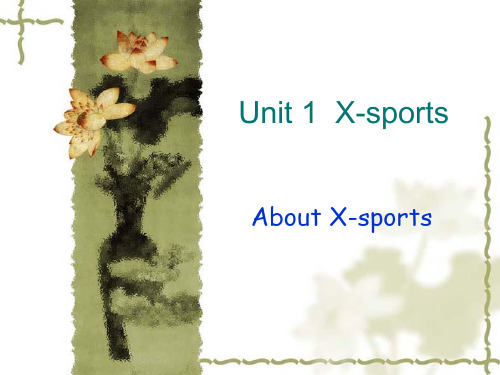
nervous in the dark.
have a lot of guts 需要极大的勇气
One needs to have a lot of guts to do extreme sports.
Key
1. a) to watch someone do it b) to jump one thousand feet…your legs c) bungee jumping 2. a) It is foolish enough to jump. b) It is far better to live a short and exciting life than to live a long but boring one.
She is well qualified for the job. 5-7-2-4-1-6-3-8
Task 5 increase v. 增加
The population has increased from 1.2 million 10 years ago to 1.8 million.
look like: seem; appear 似乎;显得
Task 4 weigh v. 称(…的重量)
How much do you weigh? [ [派生词]weight n. 重量 ]weight Bananas are usually sold by weight.
cm: centimeter 厘米 kg: kilogram 千克,公斤
be in good health: healthy 健康的 qualified adj. 符合条件的,合格的
fantastic adj. 极好的 (excellent; great)
牛津英语六年级——6AUnit1(全单元教案及反思)第一课时~.docx

牛津英语六年级——6AUnitl (全单元教案及反思)第一课时〜6AUnitlPublicsigns一单元内容分析:本单元主要围绕ldquo;公共标志rdquo;这个话题展开 各项活动,所涉及到的日常交际项目有介绍、询问、忠告 和建议等,其中以询问公共标志含义及其应答为重点内容。
学生们在日常生活中对公共标志并不陌生,但作为一个话 题来谈论有一定困难。
教学中,注意使教学内容更贴近学 生的生活,激发学生的学习兴趣,提高学生参与语言活动 的积极性。
二单元教学要求:1、能听懂、会说、会读和会拼写单词always, aquestio n, ask, mean, must, should , shouldnrsq uo; t, takeaw alk, pick ・2、能听懂、会说和会读单词和词组acousieeper, comeu p, point, fin e. 3、能听懂、会说和会读日常交际用语T herearealotofsignshere ,Theymeandi fferentthin gs. Keepoffthegrass, Beq uiet ・Nosmok ing, Nolitte ring ・Noparkn, apark,pub ff, acage,qu lie, asign, diet, makenoiokaround, ne anger, away, se, smoke, li grass, keepo ttle,sudden y, pickup, aking. Noeat in gordrinking ・ Danger! Don ottouch ・4、能听懂、会说、会读和会写句型Whatdoe sit/this/th atmean?Itme ansyou/wemu st/should/s houldnrsquo ; thellip;5、了解字母组合ea在单词中的读音。
6、会唱歌曲Thesignsi nthepark.三单元教学重难点:1、能听懂、会说、会读和会拼写单词always, aquestion,a sk, mean, mus t, should,sh ouldnrsquo; t, takeawalk , pick.2、能听懂、会说、会读和会写句型What does it/this/that mean?Itmean syou/wemust /should/sho uldnrsquo; t hellip;四单元教具准备:1、图字卡。
[英语学习]教案一册6魅力艺术
![[英语学习]教案一册6魅力艺术](https://img.taocdn.com/s3/m/b8bcb1b2e2bd960590c677f5.png)
走出牛津Beyond Oxford English For college students 1 Teacher’s packLesson plan and student worksheets with answers《走出牛津》大学综合英语教程第一册Unit 6 Charm of ArtsMoviesTasks1.S: Types of movies2.L: Westerns are my favorite3.L: Oscar Night4.L & R: A great movie fan5.S: A questionnaire on movies and English learning6.R: The First Oscar Award7.W: A posterTask 1Teacher’s notes contents1. Level, task, language, aims, materials2. Lesson stages3. Answers4. Student worksheets Pages 48-1Task 1 -TeacherLevel: 1Task: Types of moviesLanguage: Types of moviesAims: Speaking skills – Look at the pictures and talk Materials: Student’s book 1 – P 48, Exercise 1Task 1 -Teacher Lesson stagesA. ScenarioB. Exercise 1C. V ocabularyD. Students’ activityTask 1 -AMatch pictures with their titles.Task 1 -B TextTask 1 -CPractice the pronunciation of the vocabulary. Task 1 -DStudents try to work out the exercise in Exercise 1. Students try to list more types of movies.Task 2Teacher’s notes c ontents1. Level, task, language, aims, materials2. Lesson stages3. Answers4. Audio scripts5. Student worksheets Pages 48-2Task 2 - TeacherLevel: 1Task: Westerns are my favorite Language: About moviesAims: Listening skills – A short talk Materials: Student’s book 1 – P48, Exercise 2 Audio script –Available in teacher’s notes Task 2 – Teacher Lesson stagesA. ScenarioB. V ocabularyC. Exercise 2D. Question on Exercise 2E. Language focusTask 2 -ATwo people are talking about their favorite movies. Task 2 -BPractice the pronunciation of the vocabulary. Task 2–C TextTask 2 -C Answers1. F2. F3. T4. FTask 2 -C Audio scriptA: What do you think of science-fiction films?B: Well, they are all right, but I can’t say I really like them.A: And you don’t like horror films, do you?B: No. They nearly frighten me to death.A: Then, what sort of movies do you like?B: Westerns, as a matter of fact.A: Westerns? You’re kidding!B: Well, you are obviously missing the point. You see, in this kind of movies you’ve got a conflict between the forces of good and evil.A: Then who’s your favorite actor?B: Clint Eastwood, of course. He’s the strong, silent type that I like.Task 2 -D QuestionWhat would you say when asking one’s opinion on something?Task 2 -D Reference answersa) What do you think of…?b) How do you feel about…?c) What’s your opinion on / attitude towards…?d) If you don’t share the view, what would you say?e) Why do you think so?Task 2 -EExplain the usage of words and expressions.a) as a matter of fact 事实上,其实例: I’m going there tomorrow, as a matter of fact. 其实,我明天会去那里。
牛津小学英语6A Unit 1

6A Unit 1 The public signsTeaching aims:1.Words: suddenly, note, nearby, quickly, keeper, point, fine, pick up , take a walk, lookaround, come up2.Pronunciation: ea3.Song: The signs in the park.Teaching process:Step1. Free talk and revision1.Good morning, every one. Nice to see you here.st class we learnt some public signs. Let’s play games about them.3 T: Magic eyes. What does this sign mean?What about this one?And this one?3.Guessing game, what does this sign mean?Yes, you’re right.What does this sign mean?Sorry, you’re wrong. Try again.Sorry. Try again.It means ‘No fishing’Yes, you are right.4.Play the guessing game in pairs. Use these sentences…NO.1, 2, 3.Step2. Sing a song1.Look, there are signs in the park.2.Talk about the signs like this…What does this sign mean?It means…It means we should not…3. About this sign.Learn : rubbish, binput the rubbish in the bin2.Here’s a song. Try to read it.3.Try to sing.4.Now sing in groups.Step3. Read and match (Part E)1.There are lots of signs in the park.Look at this one. It says,“please keep off the grass. Fine ten yuan.”Fine? Does it mean ‘good’?Here is a funny story for you.Open your books, turn to page 11. Read and answer questions.Learn: park keeper, ten-yuan note2.There are four pictures, read the story again. Writer the correct words in the boxes.The answer is…3.There are many phrases in the passage. Underline the key phases according to thepictures.Pic 1: take a walkPic 2: see somethingPic 3: look around, pick it upPic 4: come up , point to, say to , fine ten yuan4.Now let’s read the story together.5.Try to retell the story in groups. We can give you some help.Mr Smith and park keeper. Who can try?(4 pictures , 4 people )Picture 1, picture 2, picture 3, picture 4.Step3. Listen and repeat1.Mr Smith is not happy, right? Cause he didn’t get the ten-yuan note.What about this boy? Is he happy?How do you know? What is he doing?Yes. The boy is shaking his head.Learn: shake, shaking, shaking his headShaking head means ‘No’ , Why?2.Do you know why? There are four key words, make sentences to guess.Here ‘ea’ pronounce …Read : e, words, sentences. Read in groups.3.How about these words?ea pronounce …4.So, we know a lot about ‘ea’, right?Step4. Summary1.Also, we learnt a lot about signs.We read funny stories about signs.We sang a song about the signs in the park.We played games about signs.And we know…2.We know signs are important in our life.This sign means ‘Green food’. It’s good for our health.The sign ‘3 C’ is a sign for toys. We should buy toys with this sign.And this sign means there’s a school in front. Be careful. It’s good forthe students.3. Signs makes our life more orderly and interesting!Homework:1.Read and recite Part E,try to retell.2.Sing the song after the tape.3.Collect more words and funny stories about signs.教学设计:本节课是第一单元的第三课时。
牛津版 Module6 Unit1 Reading (共22张PPT)
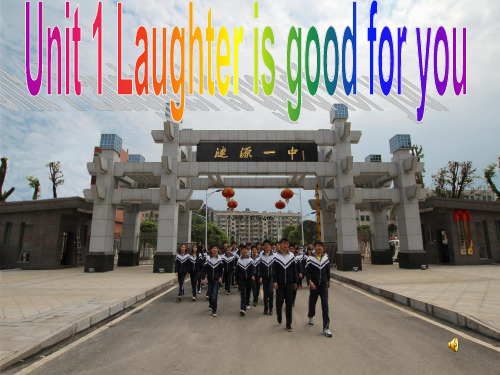
d. doing impressions
Please guess the type of stand-up comedy according to what you hear or see.
Listen and tell
Telling jokes
Do you want to eat my meat too?
net without losing weight 5) asking why it rains when
you forget your umbrella 6) tripping over chairs, walking
into doors and falling down on stage.
Types a. telling jokes b. visual humor
Relying on 4__v_is_u_a_l_h_u_m__o_u_r__ ---inspired by objects
Giving funny performance to 5._ a_m__u_se__p_e_o_p_l_e_/m__a_k_e_p_e_o__p_le_l_a_u_g_h____
Awards? 2. What do you always keep in your pocket when
you host the Academy Awards/show? Why? 3. Why are you becoming so famous? 4. Do you have any suggestions for the students in
Scan the text and give the structure.
牛津英语1B教案 unit 6
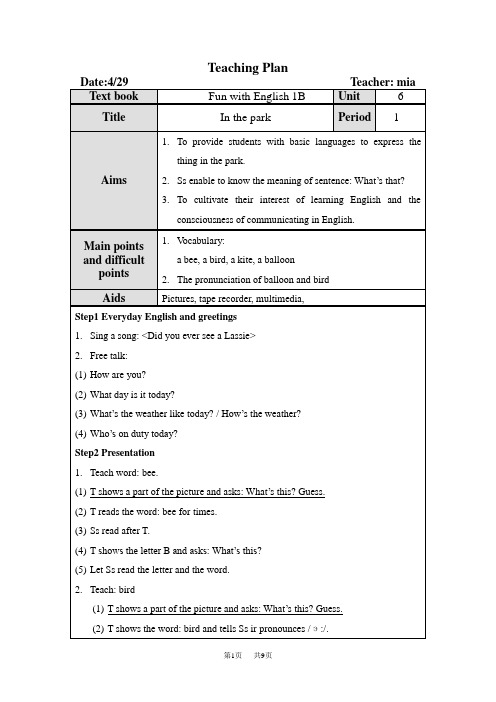
第4页 共9页
far distance or keep the distance of the thing and say: What’s that? It’s reall surprise for me. And I give them more chance to practice in home with their parents, they can learn more words from parents.
Step 3 Presentation
1. T shows the picture of Part A. Let Ss guess where it is. 2. Ss answer and then T writes down the title of this unit on the blackboard. Ss
what’s that in the sky? T points to the picture. 5. Let Ss ask the question. Others answer. 6. Pair work. Ss ask and answer in pairs.
Step 4: Say the rhyme
(3) Ss read after T.
(4) T shows the letter B and asks: What’s this?
(5) Let Ss read the letter and the word.
2. Teach: bird
(1) T shows a part of the picture and asks: What’s this? Guess. (2) T shows the word: bird and tells Ss ir pronounces /э:/.
走出牛津unit1

Unit 1 X-sportsPart 1 About X-sportsTasks1. S: Forms of X-sports2. L: Taking part in X-sports3. L: Going skydiving4. S: Joining the X-sports club5. R: Bungee jumpingTask 1-TeacherLevel: 1Task: Forms of X-sportsLanguage: X-sportAims: Speaking skills – Describing picturesMaterials: Student’s book 1 – P 1, Exercise 1Task 1-Teacher Lesson stagesA. Exercise 1B. V ocabularyStep 1 Lead-in to the teaching content1. Explain the relations between X-sports and extreme sportsX-sports=extreme sports2. Tell the students some knowledge about X-sports:In the past, young athletes would play baseball. Today, they want risk and excitement —the closer to the edge, the better. They snowboard over cliffs and mountain-bike down-steep mountains. And more and more young athletes are taking part in these risky activiti-es called ―extreme sports‖ or ―X-sports‖.Extreme sports are a general term for sports featuring speed, height, danger or specta-cular stunts.Extreme sports are certainly not for everyone. Most people still prefer to play basket-ball or watch sports on TV. But it has been a fact that extreme sports are gaining in po-pularity.Step 2 Practice the pronunciation of the vocabulary.Step 3 Ask students to look at the pictures of P.1 and match them with the correct names of the sports. then check the answers.Key: 1.B 2.D 3.C 4.F 5.E 6.A 7.G 8.HTask 2-TeacherLevel: 1Task: Taking part in X-sportsLanguage: About x-sportAims: Listening skills – A short talkMaterials: Student’s book 1– P1, Exercise 2Audio script –Available in teacher’s notesTask 2-Teacher Lesson stagesA. ScenarioB. V ocabularyC. Exercise 2D. Questions on Exercise 2E. Language focusStep 1 Task 2 -BPractice the pronunciation of the vocabulary.Step 2 Task 2 -A(A talk between Lily and Mike about x-sport)1.Play the tape for the students to listen to and ask them to write down the words or phrasesthat can express“参加”or“参加......运动”take part in, go in for, go skiing/ snowboarding...2.Replay the tape and ask students to finish the exercises, then check the answers.Step 3 Task 2 -D QuestionsDivide the students into groups and ask them to discuss the following:What sports are called extreme sports?Why do many people go in for extreme sports?Do you like extreme sports?Step 4 Task2-EExplain the usage of words and expressions.a) go in for 爱好(某种业余活动)例:Tom goes in for beach volleyball. 汤姆喜欢沙滩排球。
走出牛津第一册_unit_6_陈晶晶老师制作.
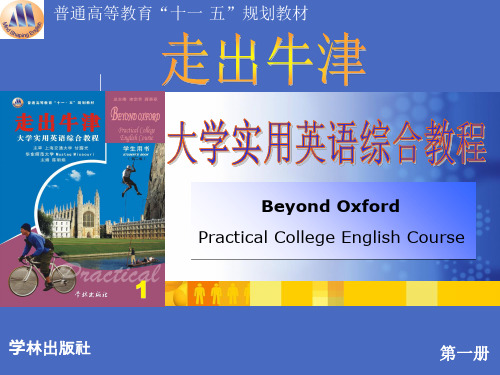
*deliver v. 交付,投递 e.g. The shop is delivering our new bed on Thursday.
deliver的名词形式为delivery,意为“递送,投递,交付”。 e.g. The next postal delivery is at four o’clock.
believed to bring good luck. 这个很漂亮。我相信他会喜欢的,先生。我们中国人更喜欢 买一对花瓶,而不是一只,因为我们相信“二”这个数字能带 来好运。 一个好的导购员应该具备一定的心理学知识:了解顾客的购 买心理。请注意,导购员在这里使用了一些与心理相关的词 汇,如so attractive, sure, good luck等,在真实地介绍产品的 同时,也满足了顾客的心理需求。
every hour.
学林出版社
Back
Next
2. Selling vases
13
pack当名词用表示“背包,一群,一小包”等含义。 e.g. The soldiers had to carry their heavy packs across rough ground. Mary took a pack of cards from the drawer and we all sat down to play.
15
A customer enters the clothing section of a supermarket. The
sales guide helps her choose a coat.
Listen to the tape or CD and put the following statements in the
2020牛津上海版一起六上Unit6Goingtoschool1

Unit Six Going to schoolPart1 ListeningI. Listen and choose the right picture (根据你听到的内容,选出相应的图片)1._______2. _______3. _______4. _______5. _______II. Listen to the dialogue and choose the best answer to the question you hear(根据你所听到的对话和问题,选出最恰当的答案)( )1. A. On foot. B. By bike. C. By bus. D. By underground.( )2. A. About 20 minutes' walk. B. About 10 minutes' walk.C. About 50 minutes' walk.D. About 15 minutes' walk( )3. A. The boy goes there by bus, but the girl doesn't.B. The girl goes there by bus, but the boy doesn't.C. They both go there by bus.D. They both go there by bike.( )4. A . On foot. B. By bike. C. By bus. D. By underground.( )5. A . A doctor. B. A hotel worker.C. A scientist.D. A nurse.III. Listen to the passage and tell whether the following statements are true or false (判断下列句子是否符合你听到的短文内容,符合的用“T”表示,不符合的用“F”表示)( )1. Simon lives near school.( )2. He usually takes the underground to school.( )3. He spends about half an hour traveling to school. .( )4. He sees some relatives on his way to school.( )5. It takes him about five minutes to walk to school after he gets off the underground.)) The students in Mr. Brown's class are very (1)_______. Bill, (2)______ and Jane are working on computers. Mary is (3)______ up her hand. Wang Lin and Tom are drawing a (4)_______ . Bob is reading books by (5)______ .Part 2 Vocabulary and GrammarI. Choose the best answer (选出最恰当的答案)( ) 1. It takes me half _____hour to get to school.A. anB. aC. theD. /( )2. Alice goes to school _____bus and comes back _____foot.A. by.. .byB. by.. .onC. on.. .onD. on...by( )3. It takes me more than 2 hours to get to my friend's home. He lives _____here.A. quite far away fromB. nearC. quite nearD. not too far away from( )4. There is _____advertisement board in front of my flat.A. aB. anC. theD. /( )5. The film will start _____eight thirty.A. onB. inC. atD. for( )6. The boy takes an underground, _____walks for ten minutes to get home.A. thanB. thenC. afterD. /( )7. It usually _____Peter an hour to get to school.A. takeB. takesC. is takingD. took( )8. ______time do your family members usually spend travelling in a day?A. How manyB. How oftenC. How longD. How much( )9. - ______does it take you to get to the supermarket?-About 10 minutes.A. How manyB. How muchC. How longD. How often( )10.I like having lessons in a ______.A. schoolB. restaurantC. hospitalD. department store( )11. She saw ______new students at the school gate this morning.A. a lotB. a littleC. a groupD. a few( )12.1 will visit a friend when I _____free tomorrow.A. shall beB. am going to beC. will beD. am( )13. Would you like ______fishing this weekend?A. goB. goingC. to goD. goes( )14. _____ helps to keep the city safe.A. A shop assistantB. A cookC. A firemanD. A policeman( )15. What did you see on your way _____?A. to thereB. cinemaC. back homeD. to homeII. Choose the word or expression which is closest in meaning to the underlinedpart in each sentence (选择与下列各句中划线部分内容意思相近的单词或短语)( )1. Simon goes to school on foot.( )2. My grandma takes a walk for a quarter of an hour every day.( )3. Do you often go to the cinema?( )4. Where do you usually go on Saturdays and Sundays?( )5. Peter, would you like to work many hours in a day?( )6. You can see much traffic in streets in rush hours.III. Complete the sentences with the given words in their proper forms (用括号中所给单词的适当形式完成下列句子)1. There are many _______ on the Huangpu River. (ferry)2. _______ to many places is very interesting. (Travel)3. Have you been to any _______ in Bangkok? (temple)4. My _______ estate is near my school. (house)5.1 can see a lot of shops when I am _______ to school. (walk)6. Cherry doesn't like to be a cook because she doesn't like ______. (cook)IV. Rewrite the following sentences as required (根据所给要求,改写下列句子。
